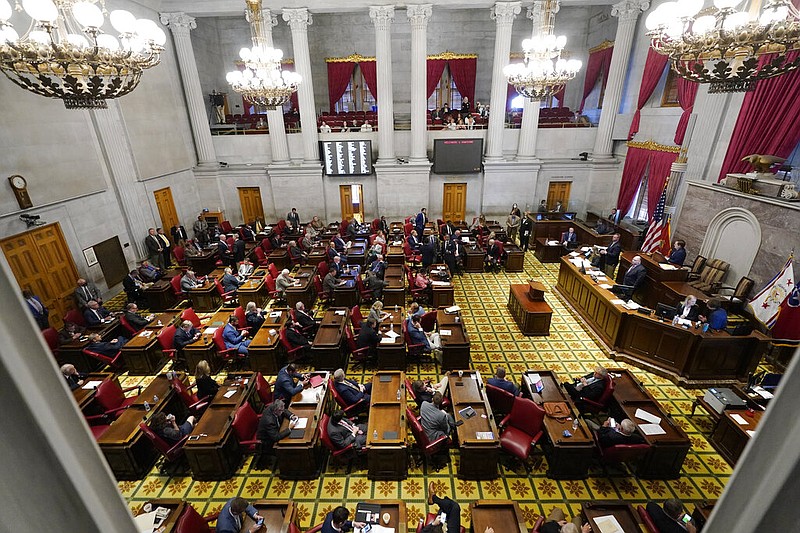NASHVILLE, Tenn. (AP) - Tennessee business leaders unhappy with recent efforts by the Republican-led Legislature to unravel COVID-19 prevention requirements hope to convince lawmakers to revisit some changes when they reconvene in January.
Two prominent business groups say they are especially troubled by a provision empowering citizens to sue businesses they believe slighted them with coronavirus vaccination requirements, which the bill largely bans for companies and government entities.
So far, Republican lawmakers who spearheaded the bill have given a cool reception to the call to revisit it by the Tennessee Chamber of Commerce and Industry and the state's National Federation of Independent Business chapter.
The dispute, while largely couched in delicate language, offers a rare glimpse at a public rift between groups that tend to be closely aligned. Republican leaders are usually eager to highlight their close ties to business and tout Tennessee as a low-tax, low-regulation haven for companies.
Those alliances were tested during the three-day special session, which ended after an hourslong October standoff. Lawmakers met behind closed doors after manufacturers including Ford Motor Co. - for whom lawmakers had just approved an economic development package for a massive new Tennessee electric vehicle and battery production project - opposed the bill's change that would let most businesses implement mask requirements only in rare, dire public health scenarios.
In the dark of the night, Republicans relented and carved private businesses out of stringent mask restrictions. Still, the bill was unsavory enough that the chamber and NFIB opposed its final form. Nine House Republicans voted no, two chose not to vote and others weren't around for the overnight finale.
Republican Gov. Bill Lee hasn't said whether he'll sign the measure, which lawmakers passed after calling themselves into session because he declined to do so. Leaders of the business groups said they have let the governor know their concerns but aren't currently lobbying for a veto. Tennessee lawmakers can easily override vetoes, and Lee hasn't vetoed anything in office.
Both business groups have expressed concerns about requirements under President Joe Biden's administration for workers at larger employers to get a COVID vaccine by Jan. 4 or face rigorous COVID-19 testing, which a federal appeals court has paused for now amid legal challenges.
But the wide-spanning state bill would put Tennessee law in conflict with the federal policy, with businesses stuck in the middle facing the prospect of lawsuits.
Before the bill passed, NFIB Tennessee Director Jim Brown warned lawmakers their votes could affect their scorecards with the group. Brown told the AP that it was only one vote - albeit, a big one - and "a lot of good friends of ours in the Legislature felt they had to vote for this and they're still going to score high." However, the group also plans to consider sponsors of separate bills opposed by business when discussing endorsements and campaign contributions, Brown said.
Bradley Jackson, president of the Tennessee Chamber of Commerce and Industry, said it's in Tennesseans' best interest for lawmakers and business to get back on the same page.
"I would equate it to two really good friends that have gotten along on so many issues had a disagreement," Jackson told the AP. "Hurtful things have been said, but we know how each other feels on this issue and fundamentally agree on the future of Tennessee on economic prosperity and working together to achieve that."
Legislative leaders have defended their work. House Speaker Cameron Sexton "disagrees with the direction NFIB and Tennessee Chamber is requesting," spokesperson Doug Kufner said. He also said there is "much discussion" about whether there's a need to extend COVID-19 liability protections for businesses past July 2022.
Senate Speaker Randy McNally's spokesperson, Adam Kleinheider, said McNally is open to hearing ideas to improve laws but is proud of the work done by lawmakers, adding that the two business groups "had ample opportunity to weigh in at any point in the process and chose to engage only in the later stages." Republican Sen. Todd Gardenhire had similar criticism when he ridiculed the chamber of commerce as the "chamber of horrors" in a committee meeting.
Brown said his group is disappointed in the "outcome and the process," saying it wasn't transparent and it was rushed.
Jackson told the AP he didn't know what lawmakers would include, and two weeks out from session, could only tell member businesses some issues that were likely to come up because he didn't know the specifics.
Looking forward, Brown said civil fines would be preferable for businesses than facing private lawsuits.
Jackson said legislation next year could also seek to tighten up definitions of what constitutes an employer's adverse action that triggers cause to sue, among other possible changes.
